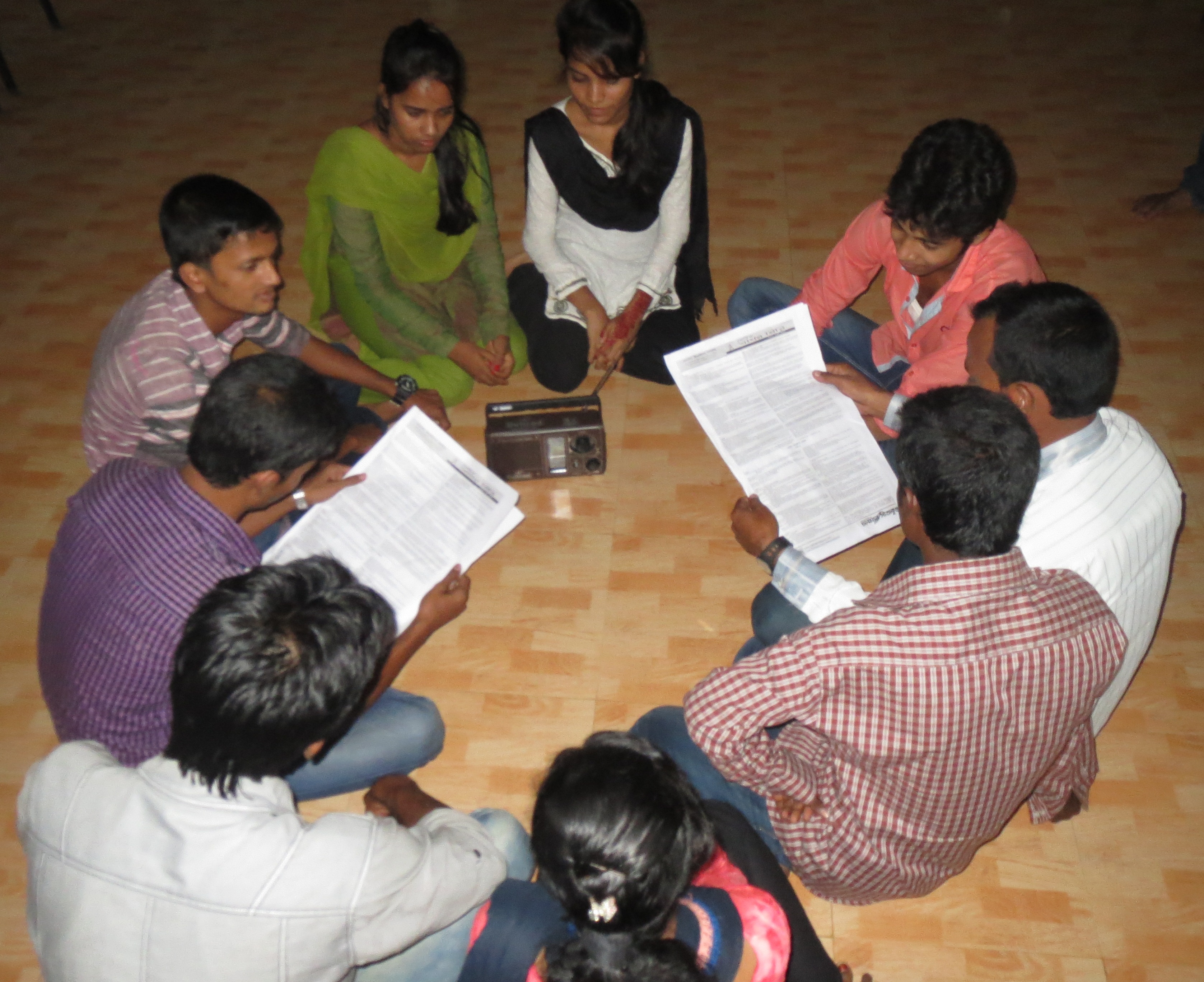Project description
In a globalized world, English language is becoming increasingly demanding due to its increased use in our business and professional sectors. Through massive use of a computer, internet and mobile phone in our day-to-day lives, in less than a decade, the English language has been placed as a significant language in our commoners’ lives. But it has been a challenge for our rural people to comply with this rapid advancement. Our traditional education system and the curriculum used at secondary levels do not keep pace with this ever-increasing demand, particularly for our youth learners in rural areas. The problem has become much more critical due to gaps between educational systems of urban and rural society. To overcome this, government is committed to minimize the gaps and materialize the vision 2021 through digital Bangladesh. In this connection, Government has provided license to the initiators, by which 17 community radio stations are now operating in 17 different rural sites. These Radio stations are one of the good educational platforms for the larger audience at community level.
An effective Radio English project English Language through Community Radio in Rural Bangladesh is now addressing the above perspective and contribute in improving the overall English language skill of the wider radio audience of the rural communities. The success stories on development through community radio are inspiring to the people and give strength to fight against poverty and other struggles in their lives. Initially, the project was piloted in one radio station in the year 2012 and now its success has been replicated in 17 radio station areas of the country. The Project is being implemented by BNNRC as a Grantee of American Center, Embassy of USA at Dhaka, Bangladesh since the year 2012.
The activities of the English language radio project are briefly described as below:
Produce Learning materials and broadcast:
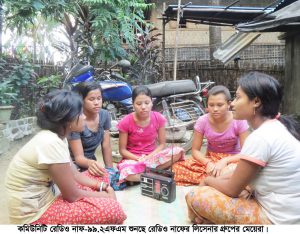 A total of 31 radio drama episodes on Basic English language learning and curriculums were developed for radio broadcasting. Radio episodes were designed for the low intermediate level learners who have had a minimum of about a year of English study. The episodes were developed in an easy, local-friendly accent, effective and entertaining mode with the support of national and international radio experts. The episodes were pre-tested among Community Radio listeners and made necessary improvements before final recording and broadcasting. The entire curriculum includes support documents and was designed for publishing in local newspapers as well as companion documents for classroom use. A teachers’ handbook for the local English teachers was developed.
A total of 31 radio drama episodes on Basic English language learning and curriculums were developed for radio broadcasting. Radio episodes were designed for the low intermediate level learners who have had a minimum of about a year of English study. The episodes were developed in an easy, local-friendly accent, effective and entertaining mode with the support of national and international radio experts. The episodes were pre-tested among Community Radio listeners and made necessary improvements before final recording and broadcasting. The entire curriculum includes support documents and was designed for publishing in local newspapers as well as companion documents for classroom use. A teachers’ handbook for the local English teachers was developed.
Media Engagement: To complement the broadcasting initiatives and contribute in community learning process local media were involved. As part of this, partnerships were developed with local newspaper which published the same learning materials/lessons in the newspaper on the day of broadcasting.
Teachers Engagement: Language and radio experts have developed the Teacher’s handbook to guide the teachers in selected schools, colleges and madrashas.Training course was conducted for teachers of the broadcasting area to cover all English language teachers from the educational institutions of the area. These trained teachers have been utilizing their knowledge and teaching skill of English language in their respective institutions.
Listeners’ Engagement: Listeners were oriented on the goal, objectives of the project, importance of English language at the global context and their responsibility. Immediately after the orientation, the listeners have formed English listeners clubs and started group listening. The listeners are also providing feedbacks to radio stations on regular basis. To encourage them in radio listening habits, Radio quiz were included in each episode and radio sets were awarded among the quiz winners.
Develop and broadcast rural success stories: A series of radio stories were developed and broadcasted in the community radio areas in local-friendly language. Expert media professionals collected, compiled and developed rural stories for broadcasting. The numbers of Radio stories are no less than 12. The stories are broadcasted once in a week in the project period.
Partners’ Capacity Development: As part of the capacity development of the Partners, 3-day Training has been organized for Radio staffs, in which Station Managers, Program Producers and Radio Presenters joined.
Knowledge sharing: At the end of the project, knowledge sharing workshops are organized to disseminate the feedbacks and lesson learned of the project among the invited experts. This workshop also generates future directions as well.
Operational Management of the Project:
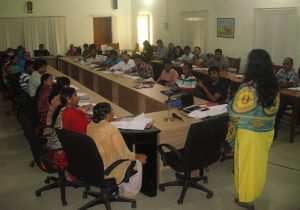 As grantee, BNNRC is responsible for overall management, coordination; monitoring and reporting of the project. An Advisory Committee was formed comprising 10 members from the media, academia and development professionals of the country. The Advisory Committee includes representatives from American Center, BNNRC, BELTA, academia and some other individual experts too. They are providing support in developing curriculum and learning materials. A coordinator on behalf of BNNRC coordinates the project in field level operation, materials development, monitoring and reporting of the project. The responsible coordinator visits the community radio stations frequently to monitor program implementation and provides necessary feedback to the radio station team on regular basis.
As grantee, BNNRC is responsible for overall management, coordination; monitoring and reporting of the project. An Advisory Committee was formed comprising 10 members from the media, academia and development professionals of the country. The Advisory Committee includes representatives from American Center, BNNRC, BELTA, academia and some other individual experts too. They are providing support in developing curriculum and learning materials. A coordinator on behalf of BNNRC coordinates the project in field level operation, materials development, monitoring and reporting of the project. The responsible coordinator visits the community radio stations frequently to monitor program implementation and provides necessary feedback to the radio station team on regular basis.
Examples of linkages between the WSIS Action Line and the SDGs:
The project: English Language through Community Radio in Rural Bangladesh links WSIS Action Line C4. Action line C4 focuses on development and promotion of programs. The focus of the project is to upgrade the English language skills of the youth at rural communities of Bangladesh by using community radio. It increases the number of listeners with relevant English language skills so that they can contribute in livelihood development activities at national level and compete in the global context. Through the project BNNRC aims to develop the capacity and skills of the rural youth who are going to lead the nation in the future.
The project directly links with SDG-4.4 and 4.7.The goals are as follows:
SDG -4.4: by 2030, substantially increase the number of youth and adults who have relevant skills, including technical and vocational skills, for employment, decent jobs and entrepreneurship.
SDG- 4.7: By 2030, ensure that all learners acquire the knowledge and skills needed to promote sustainable development, including, among others, through education for sustainable development and sustainable lifestyles, human rights, gender equality, promotion of a culture of peace and non-violence, global citizenship and appreciation of cultural diversity and of culture’s contribution to sustainable development.
The above targets comply with the objectives of this project which aim to increase the number of skilled English language professional among rural youth who will acquire knowledge and skills needed to promote sustainable development.
The project directly contributes and relates to C4: Ensure inclusive and equitable quality education and promote lifelong learning opportunities for all and C8: Promote sustained, inclusive and sustainable economic growth, full and productive employment and decent work for all. Focus of the action line C4 includes equipping people with the language skills and competencies and to meet up the growing need for acquiring knowledge in the use of community radio, capacity building interventions focusing on the development and promotion of programs more professionally through media.
Empowering communities in ICT use and promoting the production of useful and socially meaningful content is a capacity building intervention that can increase scientific knowledge and promote innovation and research.
Highlights of the project’s partnership activities:
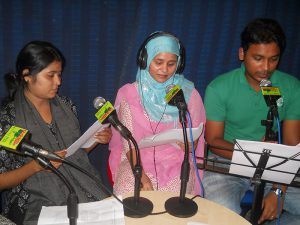 BNNRC is the main implementing partner while American Center has provided technical and financial assistance in implementation of the project. The project was started with one community radio station in 2012 and now it is being implemented in 17 community radio stations. BNNRC has made a partnership cooperation agreement with those community radio stations. BNNRC team has conducted capacity assessment of those stations and provided skill development training to the staffs of the stations. Now the trained-up staffs were involved in producing radio programs at station level using local dialect independently.
BNNRC is the main implementing partner while American Center has provided technical and financial assistance in implementation of the project. The project was started with one community radio station in 2012 and now it is being implemented in 17 community radio stations. BNNRC has made a partnership cooperation agreement with those community radio stations. BNNRC team has conducted capacity assessment of those stations and provided skill development training to the staffs of the stations. Now the trained-up staffs were involved in producing radio programs at station level using local dialect independently.
At present, more than 20,000 listeners actively participate through radio clubs in group listening with 200,000 more tuning in as regular listeners. Youth (male and female) make up the primary audience with a significant secondary audience of rural housewives.
Individual Radio expert from English language expert organizations like BELTA (Bangladesh English Language Teachers Association) and other language institutions are engaged in content selection and development of learning episodes, curriculum, Teacher’s Handbook and rural radio shorts. The selected English teachers of local educational institutions have been trained and the trained teachers have been utilizing their knowledge and teaching skill of English language in their respective institutions.
During production and broadcasting programs the listeners, local teachers, government officials and other dignitaries around the radio station area are invited. They responded to the phone calls of the local listeners and addressed their queries.
A strong partnership within the parties has made possible all the activities effective.
Challenges and future perspectives for the project:
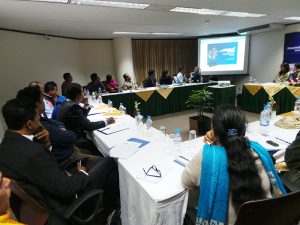 The skill acquired by the training and producing programs with practical experience at 5 community radio stations are now being replicated in 17 radio stations. English language radio program is no doubt one of the most popular and effective program. But at present, the program covers only 15% of the total population of Bangladesh. BNNRC may coordinate in this process to engage, orient and supervise the community radio stations in the future. However, the process may need some more funding support.
The skill acquired by the training and producing programs with practical experience at 5 community radio stations are now being replicated in 17 radio stations. English language radio program is no doubt one of the most popular and effective program. But at present, the program covers only 15% of the total population of Bangladesh. BNNRC may coordinate in this process to engage, orient and supervise the community radio stations in the future. However, the process may need some more funding support.
Views on WSIS Stocktaking and Prizes contest:
WSIS Stocktaking and Prize will be an inspiring model to the community media practitioners in different parts of the world. The winning of the prize will be inspiring to our future broadcasters and policy-makers.
About: BNNRC
Bangladesh NGOs Network for Radio and Communication represents the community media sector to Government, Industry, Regulatory Bodies, Media and Development Partners.
BNNRC has been struggling for the last 17 years to open up the community media (including Community Radio, Community Television) and giving focus on its vital role as voices of the voiceless rural people. The reality of today is that the bondage between the community people and local-level community radio stations are getting strengthened day-by-day. Community Radio has now become their part of life and livelihood.


